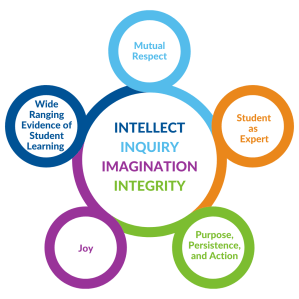March 21, 2022
By Aleta Margolis, Founder and President, Center for Inspired Teaching
Hooray for Monday is a weekly blog filled with questions, ideas, reflections, and actions we can all take to remodel the school experience for students.

 This week I spoke with my longtime friend and colleague, Cosby Hunt. In addition to teaching teachers and young people at Inspired Teaching, Cosby is currently a full-time AP US History teacher at Thurgood Marshall Academy in Anacostia in Washington, DC. He’s busy! He’s also deeply committed to ensuring all of his students experience Mutual Respect.
This week I spoke with my longtime friend and colleague, Cosby Hunt. In addition to teaching teachers and young people at Inspired Teaching, Cosby is currently a full-time AP US History teacher at Thurgood Marshall Academy in Anacostia in Washington, DC. He’s busy! He’s also deeply committed to ensuring all of his students experience Mutual Respect.
This week, and for the next four weeks, I’ll be exploring Inspired Teaching’s 5 Core Elements: Mutual Respect; Student As Expert; Purpose, Persistence, and Action; Joy; and Wide-ranging Evidence of Student Learning. Inspired Teachers strive for the 5 Core Elements in all aspects of their teaching, in all their interactions with students. If you want to build the 4 I’s in students – Intellect, Inquiry, Imagination, and Integrity – you start with the 5 Core Elements.
At Inspired Teaching, Mutual Respect means everyone’s voice matters: every student, every teacher, every parent or guardian, every school leader, every staff member, every custodian, everyone. Here’s our full definition.
I asked Cosby what Mutual Respect looks like in his classroom, and he immediately said, “Inclusion,” which he defines as “trying to give the students what they need when they need it.” Something as simple as letting a student choose to write a test by hand, instead of on the computer, is an example of inclusion, and of Mutual Respect. Cosby pointed out that mutual means students respect teachers too; and he gave a recent example of a time he’d missed his lunch break and asked the students to give him a few minutes to eat his sandwich at the start of class.
I asked Cosby how he challenges the common I-make-the-rules-and-you-

Cosby and his students co-create classroom rules, acknowledging non-negotiables (i.e. school rules around uniforms, hall passes, etc.) and finding many places where there is room for negotiation. The result is an agreed-upon Classroom Constitution, which governs both students and teacher.
Cosby also spoke about how he navigates situations when students break the rules. He’ll often begin by asking, “What’s it going to take for you to get back to this agreement that you made?” Sometimes this simple reminder is enough to reconnect students with their commitment to the Class Constitution. In this case, students can be quick to apologize for their actions and work to remedy them.
But, as Cosby points out, “Sometimes they’re not ready for that ‘sorry’ part; they’re still mad.” In this case, Mutual Respect means giving students space and time to process their feelings, to reflect. It may also mean giving the teacher time to sit one-on-one with the student and get to the bottom of the issue.
Cosby spoke about the importance of Mutual Respect in supporting students’ social emotional learning (SEL). “We can’t learn if we don’t feel safe. And if we don’t feel respected, we don’t feel safe.” Cosby shared the age old saying, “I don’t care what you have to say until I know that you care,” making the point that Mutual Respect is a critical component of academic learning, as well as SEL.
The idea of Mutual Respect is easy to embrace. No one would argue against the importance of respect in a school setting. However, it takes work to put it into practice. But the rewards are well worth the effort.
